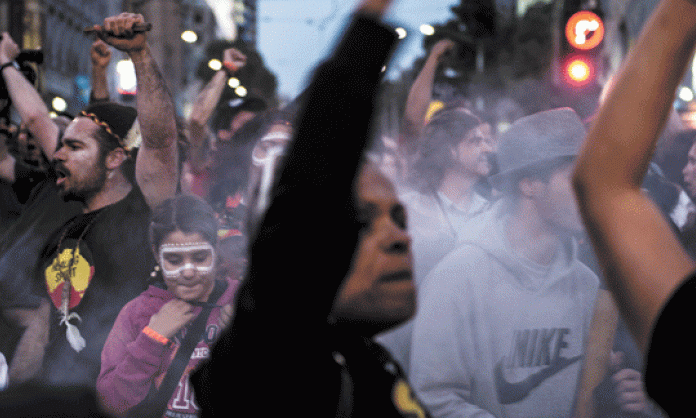For a few hours on 10 April, one of Melbourne’s busiest city intersections became something else. Outside Flinders Street Station, instead of cars and trams, thousands of people sat, circled around a ceremonial fire, listening to Aboriginal fighters speak.
It was the second time in a month the city was filled with protesters condemning plans to close up to 150 remote Aboriginal communities in Western Australia. Even as daylight faded over the sea of black, yellow and red occupying the road, the crowd that had assembled hours earlier did not dwindle.
“We are going nowhere!”, shouted Meriki Onus, a Gunnai and Gunditjmara woman, as if speaking directly to the rows of police who stood at the edges of the giant circle.
“Our goal today was to shut this city down!”, declared Pekeri Ruska, Goenpul and Yuggera woman and member of Warriors of the Aboriginal Resistance, which helped organise the rally. “As I look around today, this is the biggest one yet”, she said proudly of the gathering, which numbered around 5,000.
“I’ve lived my whole life on the land of the Kulin Nations, as most of you probably will”, started Viv Malo, Goonyandi woman, as she addressed the protest. “My family are a long way away, in the Kimberleys. They’re directly facing threat of closure, just because some little rotund man in Perth, Mr Barnett, wants to close our communities. Just like that”, she said.
“This is not new. This is all they’ve ever done. They hit the east coast first and Tassie. Australia’s a big vast land. It took a bit of time for them to get over there [to WA].
“No more! No more! To stand here before you, I declare, myself, my blood the Goonyandi, will stand between the government and my country till the day I go home.” Viv’s defiance was matched by speaker after speaker.
Danny, a Garadjeri woman, wore an Aboriginal flag over her shoulders. She talked about genocide and the mining interests which have profited from Aboriginal dispossession. “Let’s be real, we all know the real agenda is to push us off our land and dig it up to fill his greedy hands”, she said.
“I’m am sick and fucking tired, but I am angry and it is up to us to change it. We must make our voices heard; we must raise them as loud as we can to stop this cultural genocide.”
Long time activist Marjorie Thorpe, from the Gunnai and Maar Nations, read messages from some of the thousands who face being pushed off their lands. “Kids are scared”, wrote one year 12 student at a boarding school in Perth. “When they heard of the closures they thought no one would be home when they went back to their communities.”
Thorpe read the words of Margaret Culbong, a Nyoongar elder, who described the fear and uncertainty hanging over those who live in communities slated for closure. “They are in pain at the thought of being removed once again from their homeland.
“Aboriginal people are afraid, they’ve been made to feel very afraid”, Thorpe said. “But this is not the end”, she continued, now using her own words.
Christopher Bodsworth, a Kalkadoon man from the Mt Isa area spoke to Red Flag about what the fight means to him. “It’s everything”, he said. “When we don’t have our land, we don’t have anything. That’s us. That’s our home.”
One of the last to take her turn at the microphone was Maurial Spearim, from the Gamilaraay and Kooma/Muruuwari Nations. As she spoke, a sound rose in unison from the crowd – thousands were clapping in a beat as her words rose to their crescendo. “We will never cease. You have tried and you are trying, but we will never cease!”
----------
The next national mobilisations to defend remote communities will be held on 1 May.









